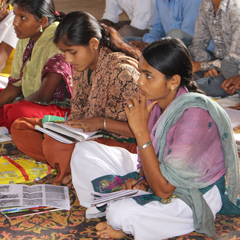-
Grants
2
-
Total Awarded
$793,000
-
Years
2013 - 2016
-
Categories
Grants
The Bixby Center for Population, Health, and Sustainability (Bixby), based at the University of California, Berkeley, is a collaboration of faculty, researchers, students, and staff working to improve maternal health and address the impact of population on global public health and the environment. Over the last 10 years, Bixby has worked with the Center for Girl-Child Education (the Center) of Ahmadu Bello University to implement an innovative girl-child education program. Previous support to Bixby, in partnership with the Center, has demonstrated the effectiveness of safe spaces as a strategy to increase transition rates from primary to secondary school and to delay marriage by an average of two and a half years. In addition, the safe-space model has shown improvement in girls' literacy and learning outcomes. With this award, Bixby will continue to partner with the Center to strengthen its capacity to effectively scale-up the safe-space model, develop additional vocational and technical curricula for girls, and improve current literacy curricula for out-of-school girls.
Located at the University of California, Berkeley, the Bixby Center for Population, Health, and Sustainability works in Africa and Asia. The Center and Ahmadu Bello University (ABU) in Zaria, Nigeria have been working collaboratively on girls’ education for over a decade. In 2008, they jointly established the Center for Girl-Child Education, a girls’ education learning hub in Northern Nigeria. Building on this partnership and in collaboration with the Zaria and Giwa Zonal Ministry of Education Offices, the Bixby Center will pilot, “Transitions,” an educational enrichment program combining school- and community-based safe spaces to reach secondary school-aged girls in rural communities outside of Zaria City in Kaduna. Using school-based safe space clubs, Transitions will combine community engagement, mentored tutoring, reduction of school fees, and support of female teachers to improve girls’ academic performance and increase girls’ transition rate from primary to secondary school.




